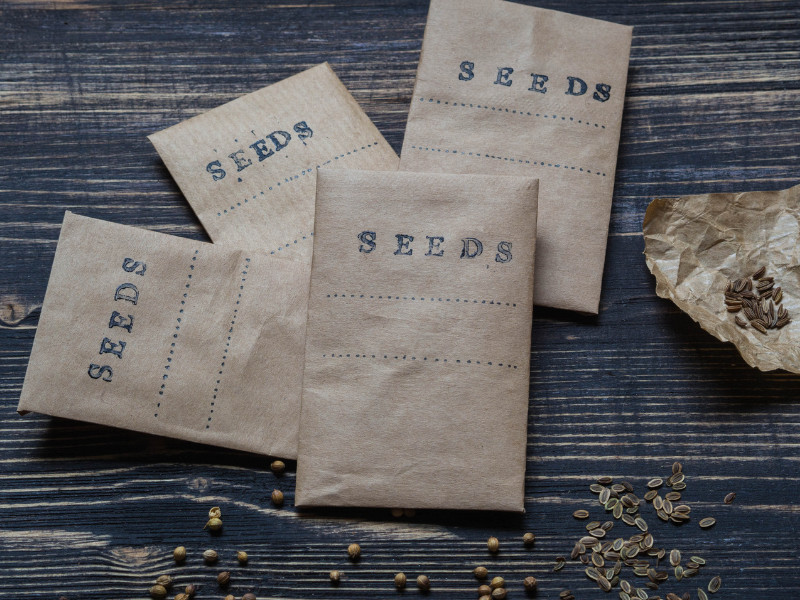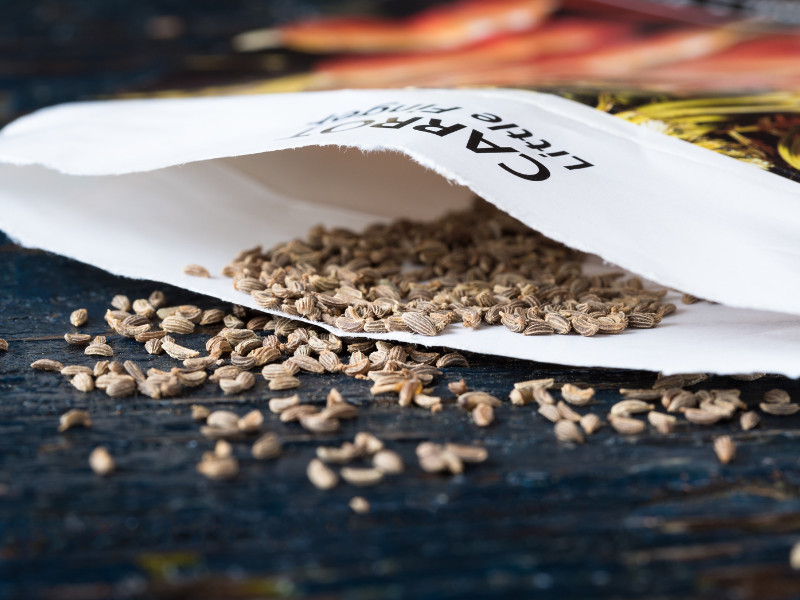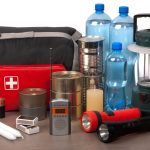Saving seeds for survival is an important skill and component of preparedness. In an increasingly uncertain world, preparedness has become a fundamental aspect of responsible living. Whether it’s natural disasters, global pandemics, or economic instability, being prepared can mean the difference between thriving and struggling during challenging times.
One often overlooked but essential aspect of preparedness is the establishment of a seed bank. In my guide, we will explore why having a seed bank for preparedness is crucial, what seeds to store, and how to store them properly to ensure a sustainable future.
Why Save Seeds for Survival?
Food Security
Food is a basic necessity of life, and in times of crisis, access to fresh and nutritious food can become scarce. Seed banks play a vital role in ensuring food security by preserving a diverse range of plant species and their genetic diversity. This genetic diversity is essential because it allows us to adapt to changing environmental conditions, pests, and diseases, ensuring a stable food supply in the face of adversity.
Biodiversity Conservation
Seed banks are not only about storing seeds but also about conserving biodiversity. Many plant species are at risk of extinction due to habitat destruction, invasive species, and other factors. By preserving their seeds, we can safeguard the genetic heritage of these species, preventing their loss forever. Biodiversity conservation is critical for maintaining the resilience of ecosystems and the services they provide to humanity.
Self-Sufficiency
Relying on external sources for seeds during a crisis can be risky. A well-maintained seed bank allows individuals, communities, and nations to be self-sufficient in their food production. Having access to a wide variety of seeds means that you can grow the crops best suited to your local conditions, reducing dependence on global supply chains and ensuring a more stable food source during emergencies.
Preservation of Traditional Knowledge
Seed banks are not just repositories of genetic material; they also store the knowledge associated with traditional farming practices. Many indigenous communities have developed sustainable and resilient farming techniques over generations. Preserving their seeds in seed banks ensures that this valuable knowledge is not lost and can be shared and utilized by future generations.
Best Seeds to Store for Emergency Preparedness

Selecting the right seeds for your preparedness seed bank is crucial for ensuring that you have a diverse and sustainable source of food in times of crisis. Here are some considerations and recommendations for the types of seeds to include:
- Staple Crops: These are the foundation of your food supply and should make up a significant portion of your seed bank. Include seeds for crops such as rice, wheat, maize, potatoes, and beans. These are high-yield, calorie-rich staples that can form the basis of many meals.
How to Grow Potatoes Anywhere
Grow Sweet Potatoes
Growing Cassava - High-Nutrient Vegetables: To maintain a balanced diet, include seeds for nutrient-dense vegetables like carrots, spinach, kale, broccoli, and tomatoes. These vegetables are rich in vitamins and minerals, essential for overall health.
Growing Tomatoes At Home
How to Grow Carrots in Your Backyard - Herbs and Spices: Don’t forget to add herbs and spices like basil, oregano, thyme, and cilantro. These can add flavor to your meals, making them more enjoyable even during challenging times.
Growing Basil Everything You Need To Know
Herbal Plants to Grow For Homemade Tea
The 10 Easiest Herbs To Grow in a Pot
Drying Your Own Herbs - Fruit Trees: If space allows, consider including seeds or saplings for fruit-bearing trees like apple, pear, cherry, and citrus. Fruit trees take longer to mature but provide a long-term source of nutritious food.
Growing Citrus in Pots
Growing Strawberries in Your Backyard - Medicinal Plants: Some plants have medicinal properties that can be valuable during emergencies. Include seeds for herbs like chamomile, aloe vera, and lavender, which can be used for various health purposes.
The Best Medicinal Herbs
How to Become Your Family’s Herbalist - Diverse Varieties: Aim for diversity within each crop type. Different varieties of the same crop can have varying resistance to pests, diseases, and environmental conditions. A diverse seed bank ensures adaptability and resilience in your garden.
- Local Adaptation: Whenever possible, choose seed varieties that are adapted to your local climate and soil conditions. These will have a higher chance of thriving in your specific environment.
- Open-Pollinated and Heirloom Varieties: Opt for open-pollinated and heirloom seeds. Unlike hybrid seeds, these varieties produce offspring with consistent traits, making it possible to save and replant seeds from year to year.
- Non-GMO Seeds: Avoid genetically modified organism (GMO) seeds, as they may have potential unknown risks.
How to Store Seeds Long Term

Storing seeds correctly is crucial to preserve their viability and ensure they can be used effectively when needed. Follow these guidelines to store your preparedness seed bank properly:
- Choose the Right Container: Use airtight containers or resealable bags to keep moisture and air out. Clear, plastic containers with tight-fitting lids work well, as they allow you to see the seeds inside.
- Keep it Cool: Store your seeds in a cool, dry place. Seeds are sensitive to temperature fluctuations, so aim for a stable temperature between 32°F (0°C) and 50°F (10°C). A cool basement or a dedicated seed storage area is ideal.
- Maintain Low Humidity: Humidity can cause seeds to deteriorate or develop mold. Ensure the storage area has low humidity levels, ideally below 50%. If necessary, use desiccant packs to absorb excess moisture.
- Protect from Light: Keep seeds away from direct sunlight and fluorescent lights. Light exposure can harm seed viability. Store them in opaque containers or in a dark area.
- Label and Date: Clearly label each container with the type of seed, date of storage, and any other relevant information. This helps you keep track of the seeds’ age and variety.
- Vacuum-Sealed Bags: If possible, vacuum-sealed bags can be a great option. These bags remove air and help prevent moisture from getting in, extending the shelf life of your seeds.
- Freezer Storage: Some seeds, especially those from plants in temperate climates, can benefit from short-term freezer storage to break dormancy. However, this should be done with caution and precise instructions, as freezing can damage certain seeds. Research the specific requirements for each seed type before attempting this method.
- Regular Inspection: Periodically check your stored seeds for signs of moisture or mold. If you notice any issues, take action immediately to prevent them from spreading to other seeds.
- Pest Control: Ensure that your storage area is free from pests such as rodents or insects that might damage or consume your stored seeds.
Remember that different types of seeds have varying shelf lives, so it’s important to periodically assess and update your seed bank accordingly. By following these storage guidelines and paying attention to the specific needs of each seed type, you can maximize the longevity and viability of your preparedness seed bank, ensuring a sustainable source of food for the future.
Where to Purchase Survival Seeds and Banks
Acquiring the right seeds for your preparedness seed bank is a critical step in ensuring a sustainable source of food in times of crisis. Here are some trusted sources and methods for purchasing high-quality seeds:
- Local Nurseries and Garden Centers: Your local nurseries and garden centers are excellent places to find seeds adapted to your specific climate and growing conditions. They often carry a wide variety of seeds and can provide expert advice on what to plant.
- Online Seed Retailers: Numerous online seed retailers offer a vast selection of seeds, including heirloom and open-pollinated varieties. Some well-known and reputable online seed companies include Baker Creek Heirloom Seeds, Seed Savers Exchange, and Johnny’s Selected Seeds.
I recommend and use Seeds Now - Seed Exchanges and Seed Banks: Participating in local seed exchanges or seed banks can be an excellent way to access seeds that are well-suited to your region. These initiatives often focus on preserving local biodiversity and may offer unique varieties not available elsewhere.
- Community Gardens and Allotments: Many community gardens and allotments have seed-sharing programs where members can exchange or share surplus seeds. Joining a local gardening community can be a valuable resource for seed procurement.
- Farmers’ Markets: Some farmers’ markets have vendors who sell seeds, especially in the spring and early summer. Buying seeds from local growers can be a great way to support the local economy and obtain seeds suited to your area.
- Cooperative Extension Offices: Cooperative extension offices and agricultural agencies often provide information on local seed sources and may host seed distribution events or workshops.
- Seed Catalogs and Magazines: Subscribe to gardening magazines and request seed catalogs from reputable seed companies. These catalogs often include detailed information about each seed variety and can help you plan your seed purchases.
Seed Catalogs You May Not Know - Seed Saving: Consider saving seeds from your own garden for future planting. This not only reduces your reliance on external sources but also allows you to select seeds from the healthiest and most robust plants in your garden.
- Bulk Seed Purchases: Some seed companies offer bulk seed options, which can be cost-effective if you plan to store a substantial quantity of seeds. Be sure to store bulk seeds properly to maintain their viability.
- Online Marketplaces: Online marketplaces like eBay and Etsy may have individuals or small businesses selling seeds. Exercise caution and research the seller’s reputation before making a purchase.
When purchasing seeds, prioritize quality, diversity, and adaptability to your local conditions. Look for reputable seed suppliers that provide clear information about the seeds they offer, including germination rates, planting instructions, and the source of the seeds. Additionally, consider collaborating with fellow gardeners and community organizations to exchange seeds and knowledge, further enhancing your preparedness efforts.
By carefully selecting where you purchase your seeds, you can build a robust and diverse seed bank that will serve you well in times of need while contributing to the sustainability of your local food system.
Saving Seeds for Survival
Putting together a well-rounded seed bank for survival is a proactive step toward resilience in the face of uncertainty. By understanding the importance of seed banks, selecting the right seeds, storing them properly, and knowing where to acquire them, you can empower yourself and your community to thrive, even in challenging times.
As you embark on this journey of preparedness, remember that seeds not only provide sustenance but also symbolize hope for a brighter and more sustainable future. With diligence, knowledge, and a commitment to preserving our agricultural heritage, you are securing your own food source and self-sufficiency.
So, start your seed bank today, and let your garden become a beacon of self-sufficiency, biodiversity, and a sustainable tomorrow.
More on Seeds and Survival
Month to Month Guide to Vegetable Gardening
Where to Buy Heirloom Seeds
Survival Garden: Why You Need One
Savvy Garden Tips to Save You Money






